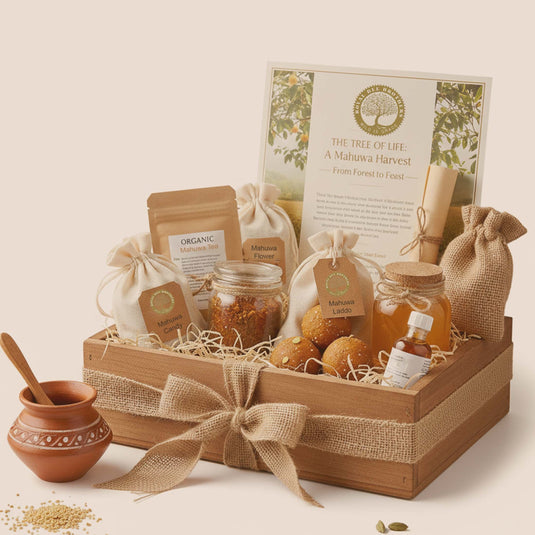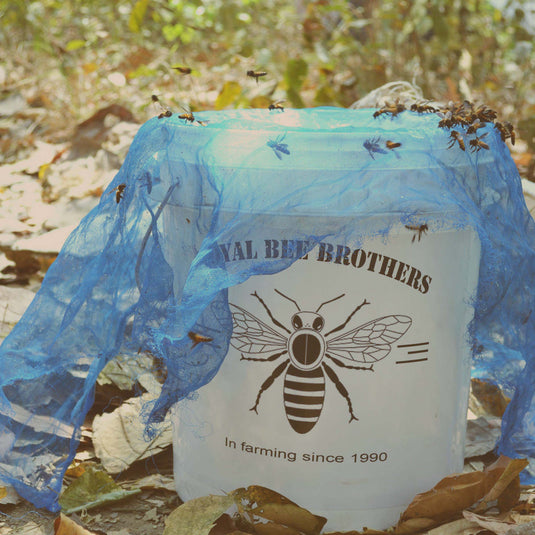Humans have been using bee products for over 9,000 years. Honey is one of the finest source of heat and energy and one of the most cherished, admired and valued natural product and nature's most remarkable gifts to mankind since ancient times. It is a superfood that has been extensively described in almost all religious books in the world such as Veda, Bible, Holy Quran, Egyptian Papyri, Hippocrates etc.
It has been mentioned as Madhu in Ayurveda scriptures and one of the most important medicines used in Ayurveda. In Jewish tradition, honey is a symbol for the New Year, Rosh Hashanah. Honey is mentioned two times in the Quran. Honey is described as a source of healing in the Quran: "And the Lord inspired the bee, saying: Take your habitations in the mountains and in the trees and in what they erect. Then, eat of all fruits and follow the ways of your Lord made easy (for you)'.
The Egyptians cherished honey so much, In the tombs of pharaohs, perfectible edible honey (along with wine, Jewellery and weapons) dating back 3,000 years is found. There are a few other examples of foods that keep–indefinitely–in their raw state: salt, sugar, dried rice is a few. But there’s something about honey; it can remain preserved in a completely edible form, and while you wouldn’t want to chow down on raw rice or straight salt, one could ostensibly dip into a thousand-year-old jar of honey and enjoy it, without preparation, as if it were a day old.
Eternal shelf life of honey
Naturally, the water content in the honey are very low, however, honey can suck in moisture if left unsealed. The pH value of natural honey falls between 3 - 4.5 i.e. it is extremely acidic in nature and this pH value can kill off almost any bacteria and spoil-ready organisms that wants to grow in the honey. However, Bees are magical, they have enzyme in their stomach called glucose oxidase. When the honey bees regurgitate the nectar from their mouths into the combs to make honey, the glucose oxidase mixes with the nectar, breaking it down into gluconic acid and hydrogen peroxide. We know the importance of hydrogen peroxide, it contains extra oxygen molecule and works against all the bad things that could possibly grow in the honey so the life expectancy inside of honey is very low.
Wound and Burn
Honey has been reported to be calming and soothing when applied to wounds and to reduce pain from burns. For this reason, honey was used to cover a wound and burn because it’s so thick, rejects any kind of growth and contains hydrogen peroxide, it creates the perfect barrier against infection for wounds. In fact, some of the companies are marketing their special medical honey and developed bandages covered in honey.
Cough and sore throat
Honey can bring relief for your sore throat. The World Health Organization (WHO) and the American Academy of Paediatrics both endorse honey as a natural cough remedy. Honey is a time-honoured remedy for cough and cold. And the same, is endorsed by the Ayurveda since thousands of years. Rich in antioxidants, antibacterial and antimicrobial properties, the yellow liquid soothes the throat, alleviating irritation and helping to break up the mucus. And now even science has backed the claims and have suggested that honey is better in treating coughs and colds than your other over-the-counter antibiotics. Mixing 2 parts lime juice with 1-part honey to use as a gargle for sore throats and mixing an equal amount of honey and ginger juice for use as a cough syrup.
For healthy Heart, Liver, Eye and Mind
Honey has the ability to act as a dietary antioxidant. High-quality honey contains organic acids and phenolic compounds like flavonoids. Scientists believe that the combination of these compounds gives honey its antioxidant power. According to the scientific literature, honey applied alone or in combination with conventional therapy might be a new antioxidant in the control of commonly associated with oxidative stress. Antioxidants have been linked to reduced risk of heart attacks, strokes and some types of cancer. They may also promote eye health.
For healthy glowing skin
Honey is one of nature's most revered skin remedies. Honey fights free radical damage and pollution with its antioxidant, antibacterial and antiseptic properties, naturally cleanse your face and even lighten pigmentation. With its moisturizing and soothing effects, it may benefit oily & acne-prone skin and helps keep the skin moist but not oily. Honey as an ingredient has been used to make natural honey soap since long time. Honey with dark color has been considered more optimal for skin usages.
Remedy for Hair-fall
Honey's rich antioxidant properties helps in controlling the hair fall when using it with Yogurt. It is an effective remedy for dandruff. The citric acid present in yogurt helps in fighting dandruff and rejuvenating your hair while honey strengthens them and promote growth of thick and strong hair.
Helps in weight loss
Undeniably the combination of consuming honey with warm water and a few drops of fresh lemon juice has been prescribed by experts as one of the most successful hacks to lose weight. It is believed that having warm water every morning flushes out toxins from your system and regulates weight in the long run. Honey acts as a fuel to make the liver produce glucose. This glucose keeps the brain sugar levels high and forces it to release fat burning hormones. To benefit from the honey diet, simply replace your sugar intake with honey, throughout the day.
Home Remedies
Honey has been used with Ginger, Moringa Powder, Mulethi, Cinnamon and many more herbs and spices as home remedy for various deceases which is known as Dadi Ma / Nani Ma ka Nuksha..
Beat your hangover
Honey may help beat hangover. Fructose speeds up the oxidation of alcohol in the liver. Honey is roughly equal parts glucose and fructose, so it has the potential to cause this reaction. However, studies that looked at honey's ability to increase alcohol metabolism are using about 2 ounces of honey (8 tablespoons) per 25 grams of alcohol, which would be about 480 calories worth of honey. We wouldn't recommend consuming that many calories worth of honey in one day.
Yummy Dishes
Honey has been used along with fruit juice to make vinegar such as with apple juice to make Honey Cider Vinegar, with Jamun juice to make Honey Jamun Vinegar. Honey with rose petals has been used since ancient times to prepare Honey Gulkand which has been used in Paan, sweets, Sarbat, honey toffy and honey filled chocolate and many more dishes.
Keep in mind that honey should only be consumed in moderation, as it is still high in calories and sugar. The benefits of honey are most pronounced when it is replacing another, unhealthier sweetener.


